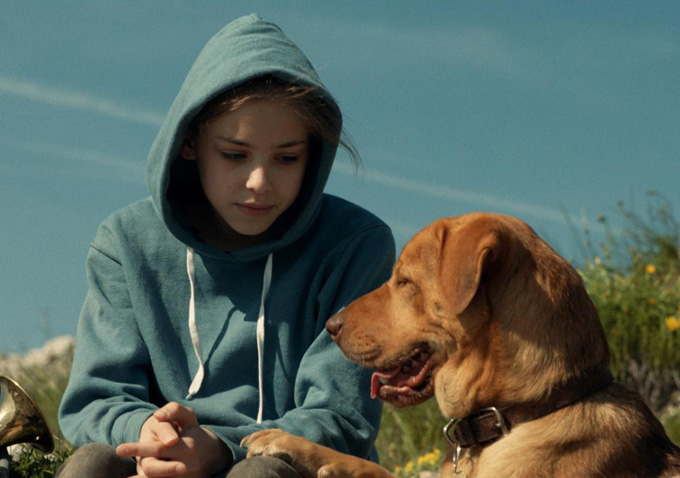
It’s a classic exploitation/revenge narrative. Hagen and Lili are best friends, until Lili goes to live with her father, who doesn’t approve of Hagen and forces them apart. Unmoored from Lili’s protective influence, Hagen wanders the streets, making tentative friends with a similar hard-luck story, before being captured and sold into bondage. Once his potential as a fighter is spotted, he is trained to become a bloodthirsty killer, only to flee and be caught again, this time put behind bars to essentially await execution. But here he suddenly finds the resources to put his newfound viciousness to use, staging a bloody escape and leading an army of fellow inmates on a rampage of revenge, encompassing everyone who’s done him wrong along the way, right back to Lili, whose abandonment was the first and maybe greatest betrayal. Lili is a young girl who plays trumpet in a youth orchestra; Hagen is a dog.

An arresting allegory for racial and ethnic bigotry that actually starts to work better as a film as the directly allegorical elements recede in favor of a cleverly eerie, resonant horror-movie vibe, “White God,” from Hungarian director Kornel Mundruczo is certainly one of the most ambitious and original films in an uncertain Un Certain Regard sidebar. So the news, hot off the press that it has won the UCR top prize is very welcome indeed. But obviously more importantly, it already had the “Palme Dog” under its belt (collar?) for Luke and Body, the canine actors who are so unforgettably relatable as Hagen that it’s hard not to suspect that they’re really Andy Serkis in a mo-cap suit.
A lot due to the scope of its ambition, “White God” does however have its share of elements that don’t quite sit into the mix. The chief issue, perhaps, is slightly unavoidable given the decision to start from a more realist perspective and only later fully shift gears into a kind of black-magic realism: a large portion of this film’s potential core audience (those who love dogs) may be so put off by the many gut-wrenching scenes of animal cruelty (faked of course, but shockingly real-looking) that they don’t even make it through to the mordant catharsis of the film’s second act. Before the dog has its day (and we are 100% cheering for the canine revolutionaries over the human characters) he has a long, dark nighttime of the soul, and watching a loyal, trusting (and absolutely gorgeous) dog having the goodness beaten and drugged out of him ranks among the most upsetting things we’ve seen at Cannes this year.

In fact, we’d suggest that the film hardly needs to spell out its alternate reading as a metaphor for human-on-human oppression to be an effective parable about human cruelty, especially when that aspect can come across as a little on the snout, so to speak, with repeated references made to Hagen being a “mutt” as opposed to a “purebreed,” and everyone, even strangers on the street, abetting his tormentors or having an even worse agenda of their own for temporarily helping him. And some of the filmmaking quirks are a little overdone too, in particular the shaky cam which gets irritating at times, especially when contrasted with some of the calmer, more beautiful, more surreal shots that pepper the narrative. Moments like the final shot’s symmetry and quiet; Hagen silhouetted in a corridor like Michael Myers in “Halloween”; a pack of wild dogs running through the streets of the deserted and terrified city. And the film’s slight overlength does tell toward the end of its two hours, with an insistently pounding score relied on a little too frequently to give a sense of drama and urgency. This could be a really sharp and nasty 90-minute film and it would punch its point home better, but given the extra half hour some of that sharpness is dulled, especially during the non-canine scenes involving Lili forgetting about her beloved dog as she develops a crush on a human boy.
But they’re small niggles in what is overall a triumphantly idiosyncratic film with smarts and visceral impact in equal measure. The “four legs good; two legs evil” dichotomy is blood-boilingly effective to the point of making us turn species-traitor in our sympathies, and like all good revenge narratives, we have to suppress the urge to stand and cheer when the bad guys get their bloody, gory comeuppance. We want our support and appreciation of “White God,” whose title of course riffs on the Sam Fuller dogs-and-racism movie “White Dog,” duly noted, because it makes worryingly plausible this kind of anthropomorphic rebellion, and when “Rise of the Planet of the Dogs” becomes a real thing, we want our new canine overlords to know whose side we’re on. [A-/B+]
Browse through all our coverage of the 2014 Cannes Film Festival by clicking here.

